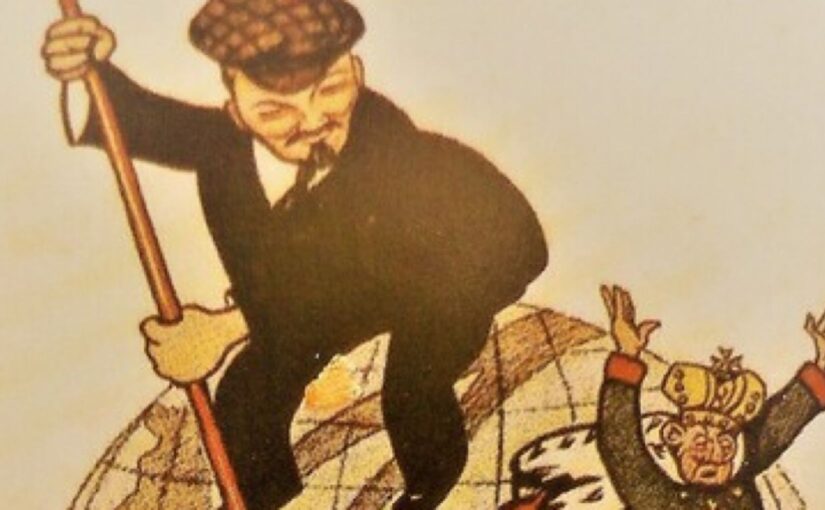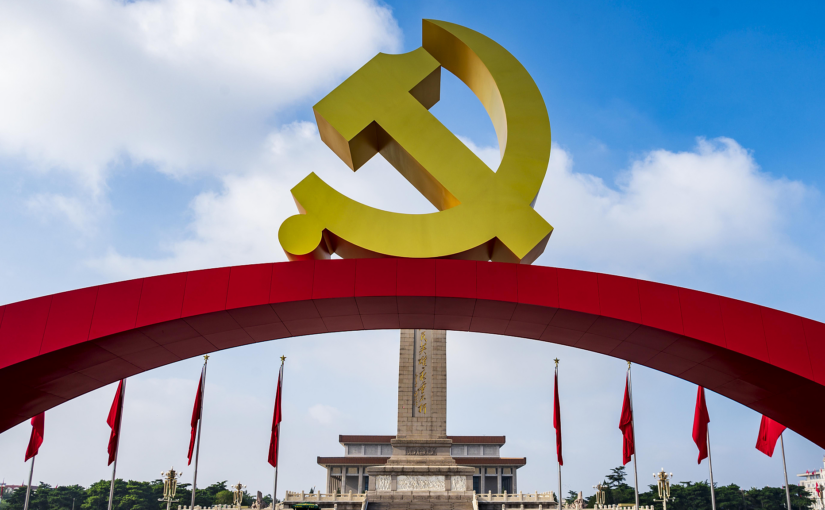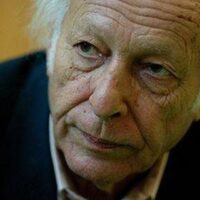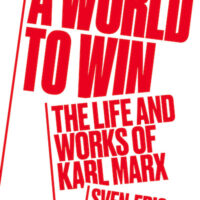The following article by Carlos Martinez, discussing Lenin’s contribution to understanding the global applicability of Marxism, was originally published on 20 January 2024 in the Morning Star, to coincide with the centenary of Lenin’s death.
The original slogan of the communist movement, ‘Workers of the world unite’ – the rallying cry and final phrase from the Communist Manifesto, written by Marx and Engels in 1848 – was put forward at a time when the nascent communist movement was geographically limited to Europe and North America, and focused almost exclusively on the industrial working class.
Lenin’s study of global political economy, and particularly of the dynamics of monopoly capitalism and the emergence of modern imperialism, led him to an acute understanding of the expanded – global – applicability of Marxist thought.
Study of imperialism
Marx had already outlined the economic dynamics of an emerging international capitalism in Volume 1 of Capital, first published in 1867: “A new and international division of labour springs up, one suited to the requirements of the main industrial countries, and it converts one part of the globe into a chiefly agricultural field of production for supplying the other part, which remains a pre-eminently industrial field.”
By the end of the 19th century, the extraordinary concentration of capital and the supremacy of finance capital had brought the era of ‘free market’ capitalism to an end and ushered in an era of monopoly capitalism – in which phase capitalism remains.
Having dominated and saturated the home market, monopolies were increasingly driven abroad in pursuit of profit. Lenin wrote in Imperialism, the Highest Stage of Capitalism that “the export of capital greatly affects and accelerates the development of capitalism in those countries to which it is exported.” Export of capital stimulated the incorporation of the “chiefly agricultural” economies of the Global South into the world capitalist system, introducing industrial production and creating a social class that had no option but to sell its labour power – the working class.
With the internationalisation of capital and the subjugation of the greater part of the planet by a handful of wealthy nations, capitalism became more and more militarised. Extreme force was needed to keep colonies and “spheres of influence” under control, and furthermore was a key feature of the rising competition between the imperialist countries for control of the world’s land, labour, natural resources and markets. Such competition was the basis for World War 1.
Lenin understood that, with capitalism having “grown into a world system of colonial oppression and of the financial strangulation of the overwhelming majority of the people of the world by a handful of ‘advanced’ countries”, the capitalist class of the metropolis had become an enemy not just to the working class in the advanced capitalist countries but to the broad masses of the oppressed in all countries. “Imperialism is leading to annexation, to increased national oppression, and, consequently, also to increasing resistance.”
This analysis provided the theoretical basis for a strategic unity of the socialist and national liberation movements, on which basis Lenin and the Bolsheviks proposed the development of a worldwide united front of the working class and all peoples oppressed by imperialism. Such a united front would be capable – indeed still is capable – of taking the fight to the oppressors, of defeating imperialism, of establishing national independence and sovereignty for the peoples of the Global South, and thereby opening the possibility for a global advance to socialism.
Hence at the second congress of the Communist International (Comintern) in 1920, ‘Workers of the world unite’ was updated to ‘Workers and oppressed peoples of all countries, unite’.
In Lenin’s report to the Third Congress of the Comintern in June 1921, he enthused: “The revolutionary movement among the hundreds of millions of oppressed peoples of the East is growing with remarkable vigour.” He elaborates on this in his letter Better Fewer, But Better, the last document he wrote:
“In the last analysis, the outcome of the struggle will be determined by the fact that Russia, India, China, etc account for the overwhelming majority of the population of the globe. And during the past few years it is this majority that has been drawn into the struggle for emancipation with extraordinary rapidity, so that in this respect there cannot be the slightest doubt what the final outcome of the world struggle will be. In this sense, the complete victory of socialism is fully and absolutely assured.”
Summing up this theoretical contribution in his 1924 book Foundations of Leninism, Joseph Stalin wrote that “the interests of the proletarian movement in the developed countries and of the national liberation movement in the colonies call for the union of these two forms of the revolutionary movement into a common front against the common enemy, against imperialism” and, further, that “the victory of the working class in the developed countries and the liberation of the oppressed peoples from the yoke of imperialism are impossible without the formation and the consolidation of a common revolutionary front.”
Imperialism and the split in socialism
Unfortunately, the pursuit of a global revolutionary anti-imperialist front was not a consensus position in the communist movement of the time. Many of the large workers’ parties in the West rejected – explicitly or implicitly – such a strategy and worked towards a tacit alliance with their ‘own’ imperialist ruling classes.
The material basis for such an alliance was provided by the superprofits of imperialism. The “high monopoly profits for a handful of very rich countries” opens up “the economic possibility of corrupting the upper strata of the proletariat, and thereby fosters, gives form to, and strengthens opportunism” (Lenin, Imperialism, the Highest Stage of Capitalism).
Further: “A few crumbs of the bourgeoisie’s huge profits may come the way of the small group of labour bureaucrats, labour aristocrats, and petty-bourgeois fellow-travellers. Social chauvinism and opportunism have the same class basis, namely, the alliance of a small section of privileged workers with ‘their’ national bourgeoisie against the working class masses.” (Lenin, Opportunism and the Collapse of the Second International)
Lenin labelled this phenomenon social chauvinism – “socialism in words, chauvinism in deeds” – and described it as “the utter betrayal of socialism” and “complete desertion to the side of the bourgeoisie.” In his 1916 article Imperialism and the Split in Socialism he wrote that “the opportunists (social chauvinists) are working hand in glove with the imperialist bourgeoisie precisely towards creating an imperialist Europe on the backs of Asia and Africa”, and that “objectively the opportunists are a section of the petty bourgeoisie and of a certain strata of the working class who have been bribed out of imperialist superprofits and converted to watchdogs of capitalism and corruptors of the labour movement.”
He pointed out that the ruling classes themselves perfectly well understand and deliberately implement this strategy. Indeed, he cites the notorious colonialist Cecil Rhodes, writing in 1895:
I was in the East End of London yesterday and attended a meeting of the unemployed. I listened to the wild speeches, which were just a cry for “bread, bread, bread,” and on my way home I pondered over the scene and I became more than ever convinced of the importance of imperialism. My cherished idea is a solution for the social problem, i.e. in order to save the 40 million inhabitants of the United Kingdom from a bloody civil war, we colonial statesmen must acquire new lands to settle the surplus population, to provide new markets for the goods produced by them in the factories and mines. The Empire, as I have always said, is a bread and butter question. If you want to avoid civil war, you must become imperialists.
Lenin concluded that, to defeat the social chauvinist trend and to move forwards with the global class struggle, communists must go “lower and deeper”; must seek out, educate and organise the most oppressed sections of the working class, “who are more oppressed than before and who bear the whole brunt of imperialist wars.” These strata are far less corruptible; are far more capable of learning “to appreciate their true political interests, to fight for socialism and for the revolution through all the long and painful vicissitudes of imperialist wars and imperialist armistices.”
Success of Leninism in practice
In words and deeds, the Bolsheviks pursued the global anti-imperialist front, seeking (in Lenin’s words) to “convert the [masses of the oppressed countries] into an active factor in world politics and in the revolutionary destruction of imperialism” (Third Congress of the Communist International).
This effort bore historic fruit. The Soviet Union rendered indispensable support to the national liberation and socialist movements in Africa, Asia and the Americas.
In his 1960 essay The Path Which Led Me To Leninism, Ho Chi Minh movingly describes his years in Paris in the early 1920s, participating in the debates between the Leninists and the social chauvinists.
My only argument was: “If you do not condemn colonialism, if you do not side with the colonial people, what kind of revolution are you waging?” … At first, patriotism, not yet communism, led me to have confidence in Lenin, in the Third International. Step by step, along the struggle, by studying Marxism-Leninism parallel with participation in practical activities, I gradually came upon the fact that only socialism and communism can liberate the oppressed nations and the working people throughout the world from slavery.
Similarly, Mao Zedong stated in 1949, just two months before the proclamation of the People’s Republic, that “it was through the Russians that the Chinese found Marxism. The salvoes of the October Revolution brought us Marxism-Leninism. The October Revolution helped progressives in China, as throughout the world, to adopt the proletarian world outlook as the instrument for studying a nation’s destiny and considering anew their own problems.”
In turn, the Chinese communists have played a crucial role in developing Lenin’s ideas of anti-imperialism and applying them in practice. The overthrow of imperialist domination and the construction of socialism in China, Korea and Vietnam represented a profound shift of the revolutionary centre of gravity in the world towards the East and the South. The radical governments emerging in the Sahel and Latin America today represent a continuation and deepening of this process.
Such are the outcomes of a revolutionary strategy based on the slogan ‘Workers and oppressed peoples of all countries, unite’. The outcomes of class collaborationist social democracy in the West are, it is fair to say, less impressive.
Lenin lives
Lenin was, above all, a revolutionary Marxist, and there are two famous quotes from Marx which to a significant degree encapsulate Leninism today: “A nation that oppresses another cannot itself be free”, and “Labour in the white skin can never free itself as long as labour in the black skin is branded.”
To be Marxist-Leninists in the 21st century means to return to a strategy of a worldwide united front between the socialist countries, the oppressed nations, and the working class in the imperialist countries. It means standing up for Palestine. It means continuing the fight for a united Ireland. It means opposing the campaign of containing and encircling China. It means opposing NATO. It means supporting the emerging multipolar trend. It means standing with Cuba, with Vietnam, with the DPRK, with Laos, with Venezuela, with Nicaragua, with Syria, with all countries defiantly standing up against imperialist hegemony. It means opposing racism, sexism and all forms of exploitation and oppression, rejecting collaborationism and social chauvinism, going “lower and deeper” and fighting resolutely for a socialist future.




